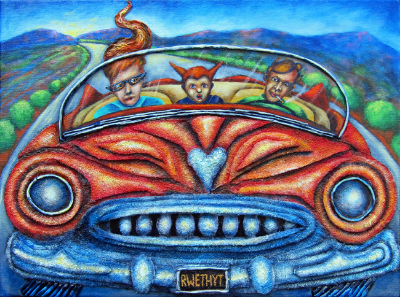Jon Tribble
RWTHYET (Are we there yet?) | Rick Cummings
Driver’s School
If I feel physically as if the top of my head
were taken off, I know this is poetry.
—Emily Dickinson
He was a screamer, called us
drunks, punks, low-life scum,
said he’d see we never get
back on the streets, behind
the wheel if he had any say,
and every Thursday night showed
the same film, Signal 30,
baby jammed between rear wheel
and fender, arms and legs
scattered across the median,
marionettes and dummies almost
indistinguishably slumping
as if all strings were cut,
nothing tangible left to hold
anything together. All of it
courtesy of the Ohio State
Police, even the title shot
of a windshield suddenly splashed
with blood, its wipers sweeping
against the red downpour.
The first weeks I saw a billboard
Jesus in my mind, Mississippi’s
own “Bloody 98” snaking through
Spanish moss and rusting tin
shacks, waiting to “claim
another victim: Will you be next?”
Shortcut to Mobile, Destin,
Panama City two-week drunks, shot-
and-beer-nights of easy, teenage,
no name, sweaty, sloppy groping.
But the shock wore off. Four or
five weeks in, during the scene
where they use the Jaws of Life,
cut the driver out of contorted
scrap metal, and the paramedics
try to lift him slow only to have
the top of his head slip off
like a dime store hairpiece—
I couldn’t help it, giggling,
then snickering, then full out
laughing. All the sergeant’s
redneck threats and nightstick
waving couldn’t stop it. Then
it spread. The woman who wore
her rabbit coat through every
class, the four Latino guys who
huddled whispering Spanish,
the young black men and women
who came in couples, the old
men who always got here first,
claiming the back rows so they
could sleep, all of us joining
in laughter, people who had
never spoken to one another
drowning out the tired warnings,
giddy and ashamed, joyously alive.
Hookslide
Down at Ray Winder Field you broke
the monotony of another Travelers’
losing season with an empty popcorn
carton you’d flattened and placed
on the concrete as an imaginary
second base. Fifty feet of baseline
then you hit the floor, ducking
the tag with your body singing out,
arms flailing in misdirection,
ending up huddled on the other side
of the bag. But your foot would hold
and the crowd cheered and bought you
beer all night, your antics replacing
ninth inning rallies that never came.
In town, you carried a piece of flat
cardboard, plywood, anything that
worked for a target, and you’d set
it down and perform for anyone with
two bucks. Sidewalks, parking lots,
dead end streets became your runways—
you said you couldn’t work on dirt—
and you’d turn your graying Cardinals
cap backwards and throw your sixty-
year-old body into each steal like
the game was on the line every time.
Your retinue of dogs and kids ran
beside you, even tumbled at the end
in a mass of paws and feet and noise.
But the bigtime was at the ballpark,
The Show for you like most of these
bush leaguers shagging lazy grounders
would never know. A standing “O”
when you walked in, the peanut-beer-
hot dog vendors kept the wide aisle
between the stands and box seats clear
for you, hawking from the stairs
to stay out of your way, and someone
let you throw out the ball at games
they couldn’t get the Governor, Mayor,
Chief of Police, or anchorperson from
a local station. A groundskeeper
would come up and sweep the aisle clean
then the place became all yours, the chant
HOOKSLIDE HOOKSLIDE HOOKSLIDE
swelling as you bowed deeply to the crowd,
took your stance and eyed the mark you’d set,
small and far away as you began to run.
BIO
JON TRIBBLE is the managing editor of Crab Orchard Review and the series editor of the Crab Orchard Series in Poetry published by Southern Illinois University Press. His poems have appeared in journals and anthologies, including Ploughshares, Poetry, Crazyhorse, Quarterly West, and The Jazz Poetry Anthology. His work was selected as the 2001 winner of the Campbell Corner Poetry Prize from Sarah Lawrence College, http://pages.slc.edu/~eraymond/ccorner/exchange/tribble.html. He teaches creative writing and literature, and directs undergraduate and graduate students in internships and independent study in editing and literary publishing for the Department of English at Southern Illinois University Carbondale.

